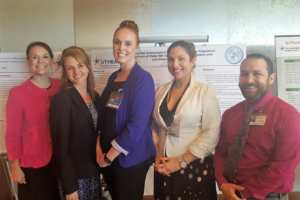
Cultivating the Next Generation of Psychologists
Inside this story:
- Meeting the mental health needs of Texans requires a robust, well-trained mental health workforce.
- In an effort to diversify and expand the behavioral health workforce, the Hogg Foundation invested in the development of eight doctoral psychology internship programs across Texas.
- All eight programs received accreditation by the American Psychological Association, unlocking additional funding and resources.
- A program in an impoverished, undeserved area of the state now offers mental health services free of charge thanks to grant funding.
- Three programs became the first to offer accredited juvenile justice internships in Texas.
- As programs consider how to retain interns while building a high-caliber behavioral health workforce pipeline, a likely next step is the addition of postdoctoral opportunities.
Most institutions received grant funds to create a new program, while others pursued accreditation of an existing program. As of 2017, all eight programs are accredited, increasing the number of APA accredited internships in Texas from 23 (as of 2012) to 31.
Total Funds Awarded
- El Paso Psychology Internship Consortium
- Scott & White Healthcare System
- Travis County Juvenile Probation Department
- University of Houston-Clear Lake Counseling Services
Phase II (2013: $771,000)
- Harris County Juvenile Probation Department
- Texas Child Study Center
- Texas Juvenile Justice Department
- UT Health Northeast (previously part of the Lone Star Psychology Internship Consortium)
Building an Accreditation-Ready Program
Travis County Juvenile Probation
Dr. Daniel Hoard serves as training director of the internship program at the Travis County Juvenile Probation (TCJP) Department in Austin. Prior to the foundation’s request for proposals, he was one of a team of two psychologists working at TCJP. A third was hired two months later. “At that time, we talked about the fact that at some point we wanted to have an internship program,” said Hoard, speaking for himself and former colleague Dr. Erin Foley.
“I did my doctoral training at UT Austin, and did clinical work within juvenile justice systems that I was really passionate about. I sought a program like this, and was shocked to find that across the country, it just didn’t exist,” continued Hoard. “This is the kind of place that breeds a cross-section of all types of youth and all types of needs, and as a result it’s a very rich environment in which to train.”
After becoming accredited, the TCJP program set a precedent that was not anticipated at its outset. “This project ended up changing the landscape of training—not just in Texas, but nationally,” said Tamara L. DeHay, PhD, President of Clover Educational Consulting Group, who conducted an evaluation of the Texas Psychology Internship (TPI) initiative. “Prior to this internship initiative, there were no accredited juvenile justice programs in the state of Texas at all. Now, all of a sudden, there are three from the Hogg Foundation’s initiative and one more in the state—meaning Texas has a total of four, which is more than any other state.”
While funding was necessary, Hoard explains that “a crucial piece of the puzzle is establishing, achieving and sustaining the buy-in from an organization. Our chief juvenile probation officer and our judges really understand the importance of having a training program, and the fact that we are developing psychologists-to-be.”
The increasing relevance and appeal of interning in juvenile justice settings speaks to changes occurring at a macro level. Students come from a broad spectrum of psychology programs that stand to benefit from the learning experience provided. The career paths that interns go on to pursue are just as diverse. “We have some graduates who are in academia, who are professors, who are working in hospital settings, who are in private practice, who are in schools,” said Hoard.
UT Health Northeast
 A few hundred miles north of TCJP is UT Health Northeast (UT Health) internship site, headed by Dr. Kathryn Wortz. There, interns could choose from two tracks: integrated behavioral health, or neuropsychology and neurorehabilitation.
A few hundred miles north of TCJP is UT Health Northeast (UT Health) internship site, headed by Dr. Kathryn Wortz. There, interns could choose from two tracks: integrated behavioral health, or neuropsychology and neurorehabilitation.
According to Wortz, the mental health provider to population ratio in the region is just one to 25,000. Increasing the mental health workforce with the addition of an intern program impacted the health of the surrounding communities. “It’s fantastic to work with people who know they need therapy and have always wanted it, but couldn’t get it, and now they can,” said Wortz. “It’s really amazing.”
As is the case for TCJP, the program’s incorporation into a broader ecosystem creates a unique context for learning. Although the range of services required by patients is vast, the program’s focus on integrated health care helps to deepen the scope of interns’ clinical responsibilities—enriching their educational experience without stretching their knowledge too thin.
“We get to train interns in the medical center alongside family medicine residents, internal medicine residents, and so on,” said Wortz. “We have all these learners from different groups collaborating.”
The structure, which gains additional support from the participation of family medicine residents in the rotation system, blends classic clinical psychology with behavioral health practices. “We’ve developed what’s called a warm hand-off service, where we have someone floating through the whole academic health center—the medical hospital units, the family medicine, clinic and the emergency room,” said Wortz. “If you need someone to come talk to a patient, we have someone ready to do that.”
El Paso Psychology Internship Consortium at The University of Texas El Paso
Dr. Brian Sneed, training director of the El Paso Psychology Internship Consortium (EPPIC) at The University of Texas El Paso, offers participants a similarly situated internship experience, albeit with a different demographic.
“Because we’re a consortium of a university counseling center and a medical center, interns have the opportunity to do rotations at either site,” said Sneed. “They can, in a sense, cater their training to what their interests are. We’re also in a border town, and interns have the unique opportunity to provide services to a minority that is actually a majority here in the area.”
“Being in a border town, we have individuals who live over in Juarez that come to school here, and we have individuals that were born here in the States, but live in Juarez,” said Sneed. “Then we have individuals who were born in El Paso and have continued living here. Interns really get exposed to the idea that there are cultures within cultures.”
While waiting for the accreditation process to run its course, Sneed cultivated credibility for the internship program by seeking institutional support and leaned heavily on existing resources.
Adapting to Challenges
UT Health’s experience illuminates the significant challenges outside forces can have on those looking to push the envelope. UT Health was originally part of the Lone Star Psychology Internship Consortium, one of the projects supported by the foundation’s first round of funding. Because the consortium was challenged to expedite accreditation, UT Health decided to develop a program independently and the consortium’s administrators made the decision to transfer what remained of the grant to UT Health.
“Talk about generous, right?” said Wortz. “That money allowed us to take time away from our clinical duties and provided the salary support that got our solo program off the ground.” Despite the Lone Star Psychology Internship Consortium’s dissolution, Wortz believes that it gave UT Health some much-needed orientation and insight.
Accelerating Sustainability
The development of the TCJP internship program has occurred concurrently with the expanded role of psychology in the juvenile justice system. Interns now have the opportunity to observe The Children’s Partnership, a program in Travis County that utilizes a “wraparound” model of care to prevent youth from entering the juvenile justice system. “The interns sit as part of the team each time The Children’s Partnership meets and provide mental health expertise, as well as knowledge of juvenile justice, ” said Hoard.
At UTEP, the establishment and accreditation of EPPIC brought about gains in capacity. “Having the internship program has allowed us to do a lot more than we were previously able to,” said Sneed. “We have a new assessment program because of the internship, and we’re able to serve a larger population.” Since the program began, at least one member of each graduating class has elected to stay on with the community. Most of those retained are bilingual (Spanish and English speaking). The language and cross-cultural implications are enormous.
What’s Next
 Program leaders also expressed interest in enriching the internship experience by partnering with other community agencies. If the success of TCJP’s arrangement with The Children’s Partnership is any indication, collaborations among providers will ease access to mental health supports, embolden integrated care approaches, and strengthen the communities in which they serve.
Program leaders also expressed interest in enriching the internship experience by partnering with other community agencies. If the success of TCJP’s arrangement with The Children’s Partnership is any indication, collaborations among providers will ease access to mental health supports, embolden integrated care approaches, and strengthen the communities in which they serve.
The need for this sort of programming is evident across Texas. Recently, in October 2016, the Hogg Foundation funded a two-year grant to The University of Texas Rio Grande Valley (UTRGV) School of Medicine to plan for the launch of a psychology doctoral internship program. Additionally, Valley Baptist Legacy Foundation recently awarded a $500,000, multi-year grant to UTRGV to support the implementation of their psychology doctoral internship program.
“I think this initiative did accomplish what it set out to accomplish, and I think it’s very impressive that [the Hogg Foundation] funded eight programs and we now have eight accredited programs,” said DeHay. “I think that really speaks to the Hogg Foundation as a funder, and their ability to select grantees that really are the right grantees.”
RELATED CONTENT
TPI Evaluation
A study of the initiative, by Clover Educational Consulting Group.
About the TPI Initiative
Paving the way for a stronger behavioral health workforce.
Understanding Accreditation
Considering accreditation? Check out this helpful guide.
